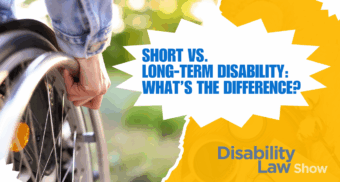Disability Law Show – Season 4 Episode 30
Episode Summary
5 THINGS TO REMEMBER FOR CLIENTS UNSURE ABOUT THE LEGAL CLAIMS PROCESS on Season 4 Episode 30 of the Disability Law Show with disability lawyer and national practical leader and Partner James Fireman.
Watch above to discover the steps you need to take when the insurance company cuts off or denies your long-term disability claim in Ontario, British Columbia, or Alberta, on the only disability law show on TV and radio in Canada.
Episode Notes
Long-COVID-19 and its impact on the ability to work
Many individuals who contracted COVID-19 are now experiencing long-term symptoms of the virus. What is the likelihood these claimants will be approved for long-term disability benefits?
- COVID-19 Long-haulers and LTD: Many claimants who are currently experiencing long-covid-19 have unfortunately been denied LTD. Insurance adjusters and companies have taken the stance that due to the novelty of the virus, a lot remains unknown. It is important to remember, however, that a diagnosis is irrelevant in order to qualify for LTD.
- Claims process vs. legal process: Unlike the claims process, once a legal claim has been filed as the insurance company does not want a decision decided by a judge that states those who have long-COVID-19 and are disabled from working are entitled to benefits.
Failed return to work from LTD which lead to worsening symptoms
My insurance adjuster pressured me to return to work after 2 years on LTD. My health issues immediately resurfaced. What can I do now?
- Return to work after LTD: It is important to remember that those approved for LTD benefits who have had their health improve should try and return to work if they have their doctor’s support. Claimants should not return to work if they are still disabled as their condition could further deteriorate.
- Recurrence clause in disability policies: Most disability policies contain a recurrence clause which states that those who have attempted a return to work and failed should be able to resume their benefits without an elimination period.
5 Things to remember for clients unsure about the legal claim process
- Once a legal claim is filed, claimants no longer need to deal directly with the insurance company: As soon as a claim has begun, a disability lawyer informs the insurance company that they have been retained. Insurance adjusters must communicate with claimants through legal representation.
- Filing a legal claim permits clients to focus on their treatment and recovery: Claimants no longer have to worry about communications and battling with the insurance adjuster. In many ways, beginning a claim can alleviate stress and allow individuals to focus primarily on their own health and recovery. This is particularly significant with long-term disability for mental health.
- LEARN MORE ABOUT INVISIBLE ILLNESSES AND LTD
Anxiety disability disorders
Depression Disability Benefits
- LEARN MORE ABOUT INVISIBLE ILLNESSES AND LTD
- If your disability improves during the legal claim, you can return to work: It is a common misconception that once a legal claim has begun a claimant is beholden to remain at home despite an improvement in their health. The ultimate goal for individuals should be their recovery and improvement and to be able to return to their job.
- It is extremely rare for a legal claim to progress to a courtroom: Most legal claims do not lead to trial and court. Insurance companies do not want a judge deciding over claims.
- Disability lawyers can and do work on contingency fees: Claimants will not have to pay legal fees upfront which can alleviate a lot of the burden. Contingency fees are key as most clients are no longer working and cannot afford additional financial obligations. As a disability lawyer on contingency is only paid due to a resolution, legal representation will work efficiently to ensure a claim is resolved quickly.
Apply for CPP Disability while on long-term disability
I was approved for long-term disability benefits a few months ago. My insurer is now asking that I also apply for CPP Disability. Is this normal?
- CPP Disability and long-term disability benefits: Many disability policies contain language that deals with CPP Disability. Claimants who have been paying into CPP are entitled to receive CPP Disability that has a severe and prolonged disability. Insurance companies are entitled to take a credit from the CPP Disability and reduce their payments.
- Long-term disability policy provisions: Claimants who apply for LTD must abide by all the provisions and terms outlined in their disability policies. A failure to comply with certain measures can lead to benefits being denied or cut off. In many cases, despite claimants not applying for CPPD, insurance companies will assume that they have or could and will deduct benefits.
Told to take different medication after an IME
I was approved for disability due to fibromyalgia. After sending me for an assessment, my insurer’s doctor says I need a different medication which my own doctors do not recommend. If I refuse, my benefits will be cut off. What do I do?
- Fibromyalgia and long-term disability: Claimants are required to take reasonable requests and recommendations for treatment. Claimants do not have to accept treatments from the insurance company or their providers that could lead to further damage or that are contrary to their own treating medical team.
PREVIOUS EPISODE: Disability Law Show S4 E29 – Common LTD Insurance Tactics




